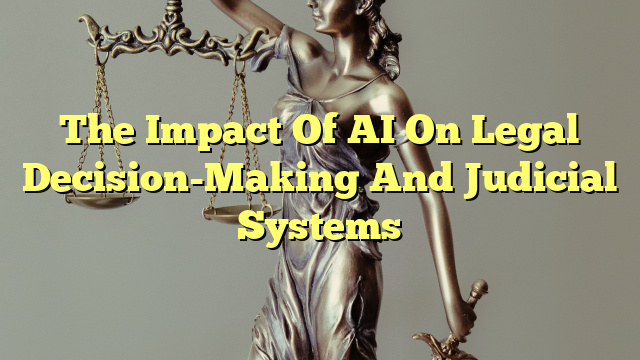Table of Contents
- Introduction
- Uses of AI in the Justice System
- Advantages of AI in the Justice System
- Disadvantages of AI in the Justice System
- Conclusion
Introduction
Artificial intelligence (AI) is the field of computer science devoted to building computer programs that can learn and make decisions. AI has been transforming various industries, including healthcare, finance, education, and entertainment. AI is also beginning to have an impact on the legal profession and the justice system. In this article, we will explore how AI affects legal decision-making and judicial systems.
Uses of AI in the Justice System
AI technologies are being used in a variety of ways in the justice system. AI can be used to speed up the process of researching legal precedent and to identify patterns in case law. AI can also help lawyers and judges make more accurate predictions about the outcomes of cases. AI-driven technologies are also being used to help automate processes such as document review and discovery, and to help streamline the legal process.
AI is also being used to help automate the sentencing process. In some jurisdictions, judges are using AI-driven technologies to determine the sentence for certain types of crimes. These technologies use algorithms to analyze a variety of factors, such as the criminal’s past record, the severity of the crime, and the likelihood of recidivism. This allows judges to make more informed decisions when sentencing offenders.
Advantages of AI in the Justice System
The use of AI in the justice system can have a number of positive effects. AI technologies can speed up the process of researching legal precedent and creating legal documents, which can help to reduce the amount of time and money spent on legal cases. AI can also help automate mundane tasks such as document review and discovery, which can help to reduce the amount of time and money spent on those tasks.
AI can also help to make the justice system more efficient and accurate. AI technologies can help judges to make more informed decisions when sentencing offenders, and can help to identify patterns in case law that may not be immediately obvious. AI can also help to reduce the amount of time and money spent on appeals, as AI technologies can quickly and accurately analyze legal precedent and identify errors in the original ruling.
Finally, AI can help to reduce bias in the justice system. AI technologies can analyze legal data without any human bias, allowing for fairer decisions to be made. This can help to ensure that all cases are treated equally and that justice is done.
Disadvantages of AI in the Justice System
There are some potential disadvantages of using AI in the justice system. AI technologies can be expensive to develop and implement, and can require significant investments in time and money. Additionally, AI technologies can be difficult to implement, and can require significant training for those who will be using them.
There are also concerns about the accuracy of AI technologies. AI technologies are only as accurate as the data they are trained on, and can be susceptible to bias and errors. Additionally, AI technologies can be vulnerable to manipulation, and can be used to manipulate the justice system for personal gain.
Finally, there are ethical concerns about using AI in the justice system. AI technologies can have a significant impact on people’s lives, and can be used to make predictions or decisions that can have far-reaching consequences. This raises ethical questions about the use of AI in the justice system, and whether it is ethical to use AI to make decisions that could have serious repercussions for those involved.
Conclusion
AI is having an increasingly significant impact on the legal profession and the justice system. AI technologies can be used to automate mundane tasks such as document review and discovery, and can help to streamline the legal process. AI can also help to make the justice system more efficient and accurate, and can help to reduce bias in the justice system. However, there are some potential drawbacks to the use of AI in the justice system, including cost, accuracy, and ethical

